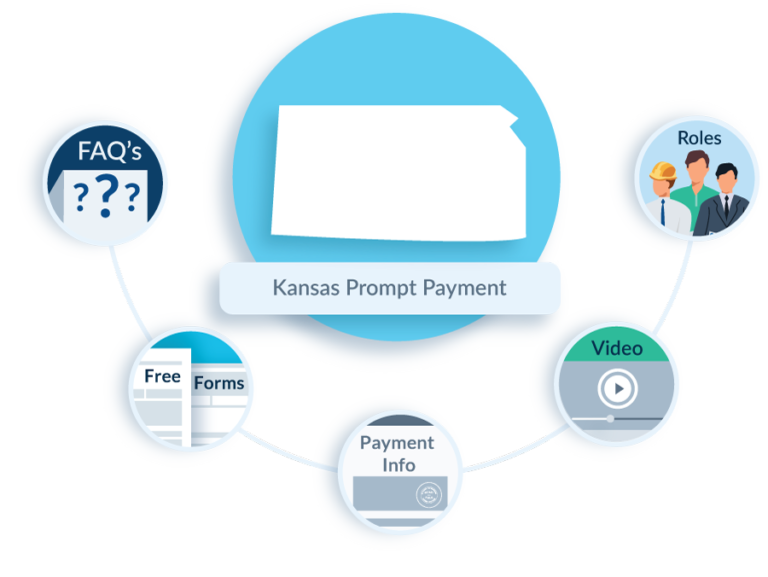Kansas Prompt Payment Requirements
- Private Jobs
- Public Jobs
- Top Links
Prime Contractors
For Prime (General) Contractors, progress payments are due 30 days of request of payment.
Subcontractors
For Subcontractors, payment is due within 7 business days after payment is received above.
Suppliers
For Suppliers, payment is due within 7 business days after payment is received above.
Interest & Fees
Interest at 1.5% per month, attorney fees awarded to prevailing party.
Prime Contractors
For Prime (General) Contractors, payment is due within 30 days of request for payment, (can be extended to 45 days under "extenuating circumstances"), unless otherwise agreed.
Subcontractors
For Subcontractors, payment is due within 7 business days after payment is received above.
Suppliers
For Suppliers, payment is due within 7 business days after payment is received above.
Interest & Fees
Interest at 1.5% per month, attorney fees awarded to prevailing party.
Prompt payment laws are a set of rules that regulate the acceptable amount of time in which payments must be made to contractors and subs. This is to ensure that everyone on a construction project is paid in a timely fashion. These statutes provide a framework for the timing of payments to ensure cash flow and working capital.
Projects Covered by Prompt Payment in Kansas
The state of Delaware regulates prompt payment on both private and public construction projects.
Private Projects
Private construction projects in Kansas are regulated by K.S.A. §§16.1801 et seq. These statutes govern payment on all private projects except for residential projects of 4 or less units.
Payment Deadlines for Private Projects
When a prime contractor performs according to the terms of the contract, they may submit a request for payment to the owner. Upon receipt of a timely and proper payment request, private project owners must release payment to the prime within 30 days. Once the prime contractor receives payment, they must, in turn, pay their subs and suppliers within 7 business days of receipt. This same 7-day period applies to all payments down to the second-tier of project participants.
Penalties for Late Payment on Private Projects
For any payments that are either late, or wrongfully withheld, interest will begin accruing on the unpaid balance. Interest will begin on the day the payment is late at a rate of 18% per year (1.5%/month). If the dispute ends up in court or arbitration, the prevailing party will be awarded costs and reasonable attorney fees.
Public Projects
Most public works projects in Kansas are regulated by K.S.A. §§16-1901 et seq. These statutes do not apply to highway construction projects, and certain other specified projects listed in K.S.A. §§75-6401 to 75-5407.
Payment Deadlines for Public Projects
Upon receipt of a proper and timely request for payment from the prime contractor, the public entity is required to release that payment within 30 days. The deadline may be extended to 45 days if extenuating circumstances exist,. Once the prime contractor has received payment from the public entity, they must release payment to their subcontractors and suppliers within 7 business days, as long as the submitted a proper request for payment. These same stipulations apply to all other payments down the chain.
Penalties for Late Payment on Public Projects
Starting on the day after payment becomes due, and late or wrongfully withheld payments will be subject to interest penalties. Interest will accrue at a rate of 18% per year (1.5%/month). Additionally, in an action to enforce the claim in court or arbitration between contractors and subs (or subs and subs) the prevailing party will be awarded costs and attorney fees.

